Trump and Musk as Opposites
The mythological Trickster and his straight man
In the run up to the American election Donald Trump’s leveraging of Elon Musk’s influence (and money), and Musk’s desire to be close to the levers of power for his own reasons saw the two become ever more entwined, in what may be the most consequential political relationship of our era. There’s no evidence Trump is uncomfortable with this, but some of his most dedicated supporters are. The biggest story of the last few days in Trumpworld is the controversy about the use of H1-B visas by American businesses, a scheme Musk favours in a way that flies in the face of the immigration-restrictionist impulses at the core of MAGA.
Musk responded to the controversy as he often does, doubling, tripling and quadrupling down via increasingly frantic tweets, each one backing him further into a rhetorical corner, culminating in the one below. Trump and Musk may have become synonymous, particularly in the minds of those that hate them, but the whole incident has exposed how fundamentally different the two are, how strange it is that fate has thrown them together, how sui generis Trump is as a political personality; and how volatile their alliance may prove to be.
Superficially the linkage between the two makes sense. They’re both businessmen, right? With Trump that’s increasingly less true. The events of the last year which led to his Napoleon-esque return to power - in particular the hair’s breadth escape from death by assassination - permanently altered public perception of him from a rabble-rousing scam artist into that, but also a world-historical figure. What he resembles is now is less a man than a figure from myth and the collective unconscious, namely the Trickster.
In folklore, and in the works of Carl Jung, the Trickster is a semi-divine figure who uses cunning, absurdity and secret wisdom to overturn the established order, though he often carries out his iconoclastic work accidentally or unconsciously. The Trickster is a boundary-crosser who inverts and capsizes; he is often vulgar, rude and cruel but can just as often turn winsomely sentimental. The Trickster is a figure that we laugh *with* as he humbles the great and exposes their self-satisfaction, but whom we also laugh *at* - a ridiculous figure, he is as often as not the butt of his own joke. The Trickster is not an intellectual but has an animalistic cunning; he is a skilled at storytelling and manipulation of language, and uses disguises (physical imitation, impersonating voices) to pursue his ends - he can find a way out of any situation, so much so that he often seems to operate on a different psychic and practical wavelength to the world around him. Being a universal mythological figure, and one which represents an essential aspect of the human character, the Trickster is indestructible. Sound familiar?
Tricksters vary from culture to culture but most important thing to the remember is that they are creatures of instinct, and that they wear their inner-states lightly - how else can you be mercurial and protean except by feeling your way through a situation rather than mapping it out, and carelessly tossing aside the the old way for the new you as soon as that becomes the more appealing option?
There is no better place to test who embodies the spirit of the Trickster than Twitter. At its best, it gives room to poke at authority figures from below, to tease and torment them, to expose their hubris, and allow them to stew unhappily as a static target while you buzz around their head. Twitter has been instrumental in revealing how full of shit the powerful are, the key function of the Trickster.
It’s notable therefore that Trump is one of the all time great posters - possibly the best, the Mozart of Shitposting - because that’s his style. Musk on the other hand is a truly abominable poster, recycling the deadest 9gag memes onto his timeline often with just a “yes” or “exactly” as his personal contribution, trapping himself into and frequently losing undignified wrestling matches with much smaller accounts, cheerfully interacting with a coterie of dorky hangers-on who are lead-footed as he is. He has none of Trump’s nimbleness, evil joy or accidental wisdom, as summarised by one of Trump's best tweets:
That summarises it nicely: Trump understands that neither life nor Twitter are about settling on one solid piece of ground above everyone else and making your home there, forever.
Musk is the opposite and we can see that by the way he responds to the H1-B fiasco. The difference in how each would react reveals something essential and different about their character. Trump would never dig further into besieged territory out of pure stubbornness - he would get out of the problem by taking the attack to the enemy but also simultaneously setting multiple other things on fire. He is completely at home in uncertainty and chaos; it doesn’t bother him the way it bothers other people. It certainly does bother Musk, who like most of us is trying at all moments to find an equilibrium where is on top, and where the world thinks well of him.
Look at how Musk responds to a single individual who posted a tweet that turned out to be fake. The first “liar” is fair enough. But to do it repeatedly, as he does here, is the behaviour of someone who is really infuriated - really wounded.
On his timeline, tweets like these - highlighting the determination that the world to acknowledge you are right when you have been wronged - are sit alongside breathlessly optimistic hype-tweets about how great his other projects are going. Reading them together reveals a person who cares deeply about how he is seen and what people say about him. This is the photographic negative of Trump, who certainly never forgets a slight but who in the final analysis has the ability to create his own reality in his head; he can simply convince himself he’s won and move on. In his cunning, he may also instrumentalise the wrong for his benefit later. Musk, like most of us, doesn’t have that ability, and a defeat or a slight sits on his soul like the demon in the famous painting The Nightmare.
The one thing that Trump absolutely never is, is neurotic. Recall his words when asked how he copes with the pressure of decision-making and risk:
It’s not just Twitter. In public, Trump is brash and loud and vulgar because that’s the real him; in contrast, when being sincere Musk is restrained and reticent and halting - because like most normal people he cares what he says, how it makes him look and how it will be received. As he has become a celebrity he has at other times adopted a self-consciously bigger and more expressive public persona; but it often seems ill-fitting, stiff and pained. We can see this because 99% of humanity is more like Musk than like Trump, and we know we would be the same way in his shoes.
In their professional lives, which is to say real estate and engineering respectively, nothing Trump has done comes close to what Musk has achieved; nothing he’s done in that sphere will be remembered as Musk’s achievements will. But politics is personality; the mercurial uniqueness and extremity of Trump’s type is what has made him successful. The people who follow in his wake or try to ride the wave of his success are forced to imitate Trump’s personal qualities, though none ever succeed - and Musk is no different. As he has moved from being a figure of practical talents to a Trump-aligned “personality” who exists in the public eye and therefore in the world of psychology and emotion, he has moved into another realm entirely where his incredible talents carry no weight.
There is something tragicomic about all this. The one thing you don’t do with a mythological Trickster who has somehow burst into your plane of existence is go into business with him, yet that’s what Musk has done. The irony is multiplied by the fact Musk is almost the exact type of person who, in folklore, the Trickster is designed to infuriate, humiliate and confound. It’s not certain how this tale will conclude and there are certainly risks on Trump’s side as well. In any case this story of clashing eternal archetypes has all the hallmarks of a fairytale, and so may yet have an ending fit for a fairytale, in the truest sense: which is to say not nice or happy, but ironic, absurd, and maybe even gruesome.

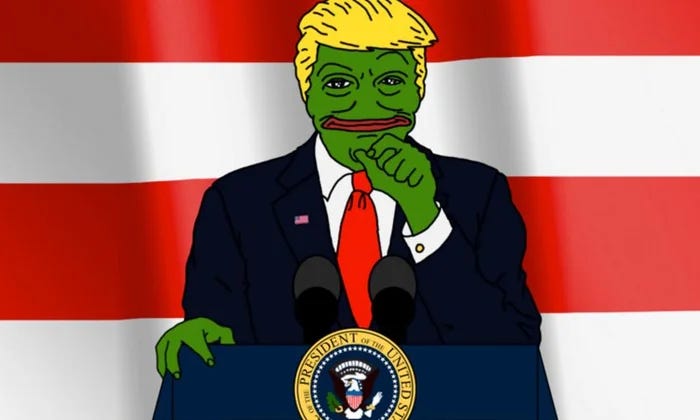
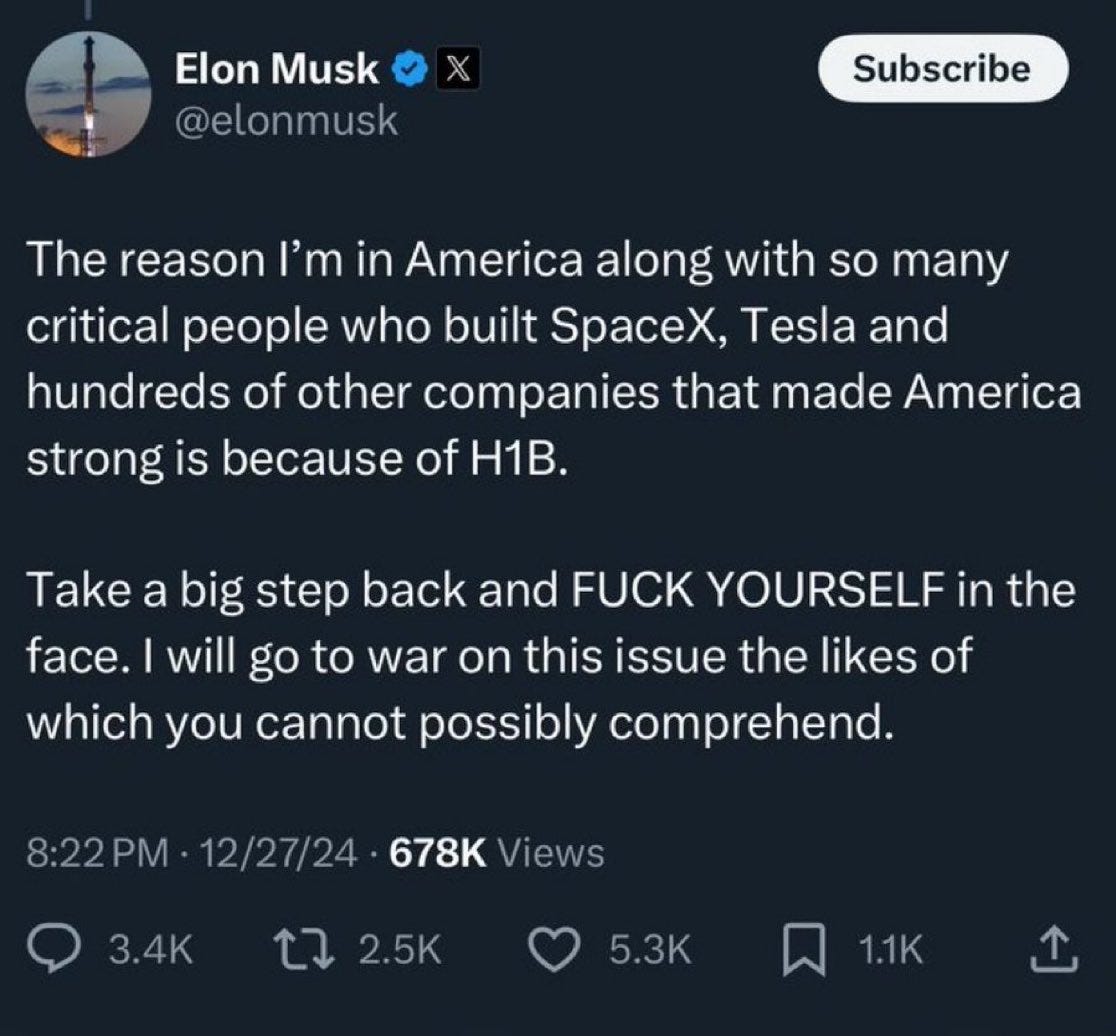


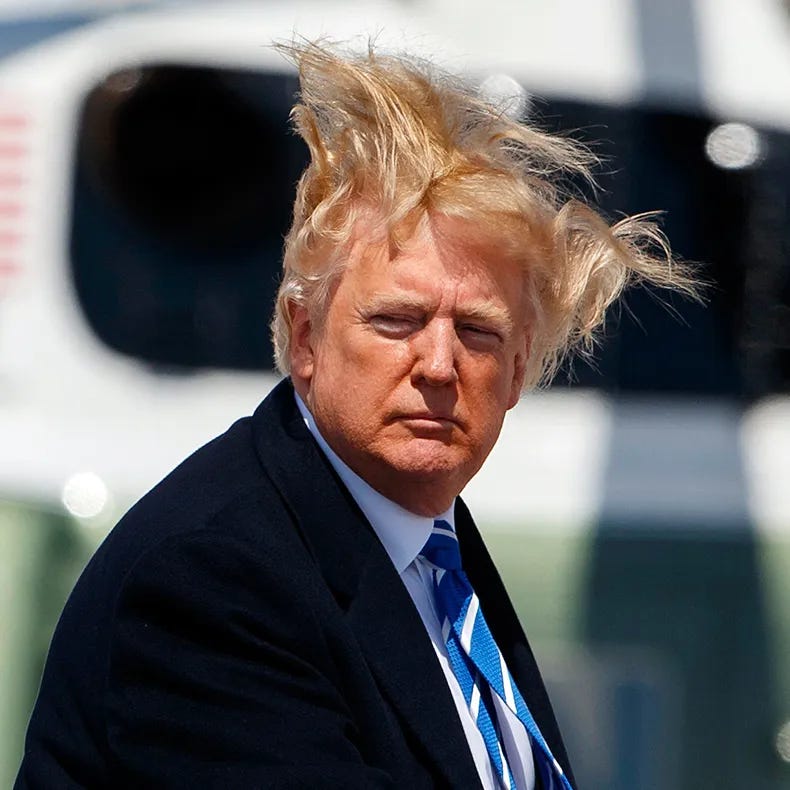
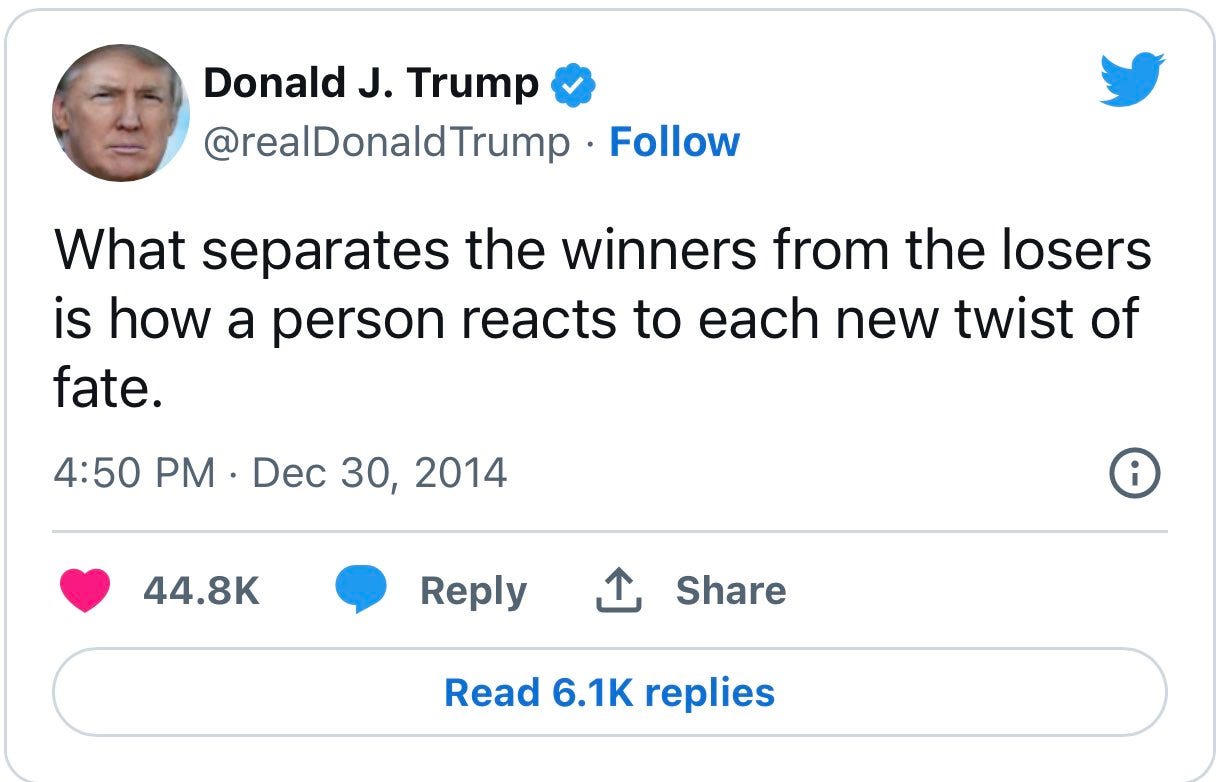
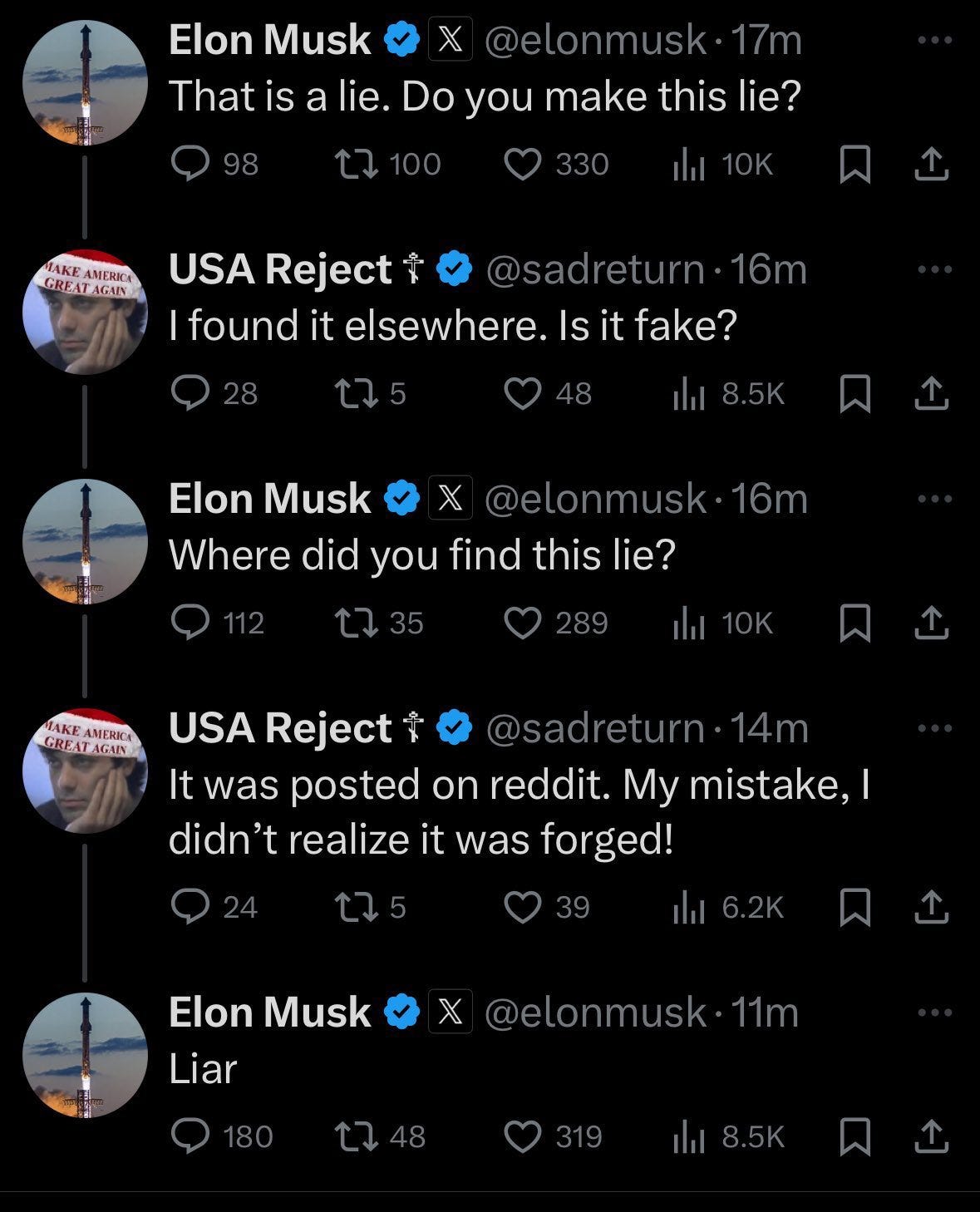



Wonderful analogy. I've also been thinking about where this particular alliance might lead – not least for the denizens of our island:
https://thedigitalharuspex.substack.com/p/a-history-of-the-revolutions-part-7e2
Great piece, very perceptive.